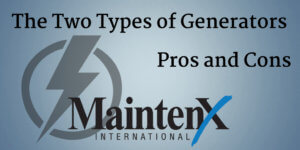
A generator can be a wise investment for a home or business owner. When the lights go out, you need a reliable source of backup power. While a great asset, it can come with high costs, so you’ll want to weigh the pros and cons before deciding which generator is right for you.
Portable Generators
Gas-powered portable generators plug directly into your appliances or a subpanel. They generally cost from $500 to $2,000, depending on brand, features, and power output.
Pros
Small and easily stored when not in use
Can be used to power a variety of things, like individual appliances or RVs
Inexpensive when compared to standby generators
Don’t require professional installation
Easy to refill fuel source
Cons
Loud motor that emits smelly gasoline exhaust
Cumbersome and must be set up each time the power goes out
A lot of long wires to manage and store after use
Maintenance needed to keep it operating for long periods
Needs to be sheltered but also kept a safe distance from the home or business being powered
Unable to generate electricity for a large building
Standby Generators
These generators are powered by natural gas or propane. They start automatically during power outages. Prices usually start at $4,000 and can go up to $7,000 or more, usually with installation included.
Pros
Much quieter than portable generators
Starts automatically when power goes out
Installed permanently on your property
Adds to property value
Much larger capacity than portable units
Cons
Expensive: thousands, rather than hundreds of dollars
Requires professional installation
Large and heavy: can weigh hundreds of pounds and often the size of a small car
Require a lot of upkeep, more specialized fuel, and must be serviced regularly if used often
Before buying a generator, consider which appliances you’ll need most during a power outage and your specific situation. A generator is a big investment, but you’ll be thankful for it the next time the lights go out.

